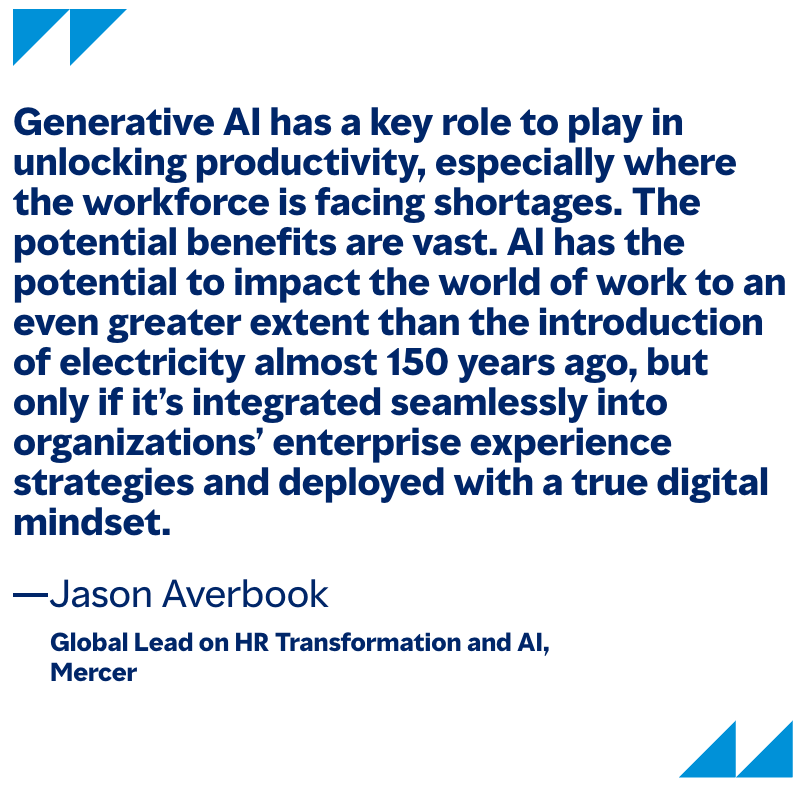As AI transforms industries and reshapes the way we live and work, organisations need to find ways to seize the growth opportunities that AI brings, and position themselves as leaders. Intelligent brands – organisations that provide high-value, critical services and technology – must differentiate themselves through their unique thinking, expertise, and insights that help power their clients' success.
In this rapidly evolving AI landscape, thought leadership has become a crucial strategy for establishing authority and helping clients navigate what's next. However, in a world saturated with content, truly effective thought leadership must centre around a compelling "big idea" that resonates emotionally while being anchored in robust data that appeals to the intellect.
At Man Bites Dog, we've been supporting our clients to craft their big AI-dea – a powerful concept backed up with substantial data. Our impactful thought leadership campaigns are designed to navigate the complexities and opportunities of technological disruption.
Here’s a round-up of some of our recent campaigns:
The New Riskonomy for Hogan Lovells

In partnership with global law firm, Hogan Lovells, we developed a thought leadership platform focused to help organisations build resilience and thrive in an evolving world of tech risk. The New Riskonomy investigates some of the most pressing factors when it comes to technology, with a focus on the recent surge in generative AI.
We conducted global opinion research amongst 1,000 General Counsel and 500 C-suite executives to explore the complex relationship between technology-related risks and corporate performance.
The Riskonomy Radar, a counterpart tool, also enables business leaders to understand where they could be overlooking tech threats to their business and to be strategically inspired by successful sectors. Our proprietary benchmarking methodology uses scored data points to categorise organisational technology risk.
The research unveiled some concerning stats: 91% of businesses are exposed to moderate or high levels of technology-related risk. C-suite and GCs identify the top technology-associated risks to their business over the next three years as data management, cyber security, a digital skills gap and misuse of generative AI within their organisation. But three in five (60%) admit their business is not taking a positive, proactive approach to technology-associated risks and doesn’t have the appropriate strategies and policies in place.
The campaign was supported with an interactive microsite. The findings are distilled into four chapters exploring organisational vulnerabilities. This was supported with sector-focused versions of the report and roundtable events.
Explore the campaign here.
The Next Organization for Mayer Brown
To help our client, Mayer Brown, a leading international law firm, reach its goals of helping its clients turn critical, complex, and challenging issues into opportunities for growth, we partnered with them to create ‘The Next Organization.’
Based on global research, ‘The Next Organization’ explores the perspectives of leaders at financial services firms on business transformation – along with their assessment of their organisation’s readiness to thrive in “the next economy.”
Unsurprisingly, AI emerged as a key theme as it reshapes the business landscape. Business leaders are becoming increasingly anxious that the speed of technological change is leaving their organisations exposed and unable to keep pace.
Key findings:
Seven in 10 business leaders (72% of financial institution leaders and 73% of investment firm leaders) say that AI developments are moving so fast that their organisation is not able to transform quickly enough and risks becoming redundant.
71% of leaders of financial institutions and 83% of leaders in investment firms believe that in the next three years, pervasive AI will have a big impact on the market environment.
Only 26% of leaders of financial institutions and 34% investment firm leaders believe they have a clear and future-ready strategy in place for AI, and the majority of both financial institutions and investment firms (65% and 67% respectively) have AI transformation strategies that only look 12 months ahead.
Read more findings in the report here.
Can AI-powered productivity solve the talent crisis for Mercer

Can AI-powered productivity solve the talent crisis? We worked with professional services company, Mercer, to find out.
We developed an economic model that revealed that AI’s potential to boost productivity could offset the headwinds from changing demographics and a shrinking skilled labour force. However, AI will not disrupt countries and sectors equally, with the finance sector predicted to see productivity gains of 14% compared to 3.1% in the hospitality sector.
According to the modelling, AI-driven productivity gains could free up 36 workdays a year for the average worker. The companies that embrace the opportunities created by AI will stand firmly on the shoulders of robots, unlocking unprecedented levels of innovation and efficiency.
You can read the full study here.
If you’d like to learn how to craft your next big AI-dea, contact one of our thought leadership experts here.
Head Office
Moore House
13 Black Lion Street
Brighton
United Kingdom
BN1 1ND
London Office
24/25 The Shard
32 London Bridge Street
London
United Kingdom
SE1 9SG
+44 (0) 1273 716 820
[email protected]
Head Office
Moore House
13 Black Lion Street
Brighton
United Kingdom
BN1 1ND
London Office
24/25 The Shard
32 London Bridge Street
London
United Kingdom
SE1 9SG